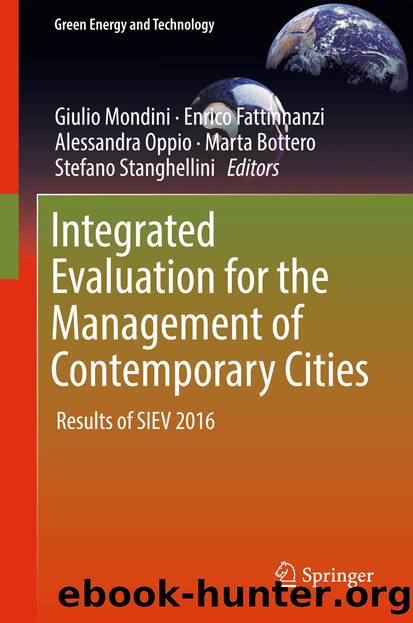Integrated Evaluation for the Management of Contemporary Cities by Giulio Mondini Enrico Fattinnanzi Alessandra Oppio Marta Bottero & Stefano Stanghellini

Author:Giulio Mondini, Enrico Fattinnanzi, Alessandra Oppio, Marta Bottero & Stefano Stanghellini
Language: eng
Format: epub
Publisher: Springer International Publishing, Cham
2 Normative and Theoretical References on the Energy Question
Although the need for a global commitment of all nations of the world has been proclaimed since 1972 (United Nations 1972), as yet, the energy policies adopted did not prove capable of confronting efficaciously the climate-change phenomenon that is still a current object of international policies (United Nations 2015).
The Encyclical Letter Laudato Sì is consistent with recent European and international energy policies, whose main objectives are an increase in the use of renewable energy, greater efficiency of the energy system (European Union 2011) and the reduction of greenhouse-gas production to levels within the Earthâs carrying capacity (United Nations 2015).
Most European countries adopted national energy policies in compliance with these directives. For example, the Italian energy policy, which is fixed by the National Action Plan for Renewable Energy (2010) and the National Energy Strategy (SEN) (2013), requires increasing recourse to renewable energy sources and the development of a transmission grid able to support diffused and nonprogrammable production of electricity (smart grid), as is the energy obtainable from photovoltaic power stations nearby the consumption centers.
As already stated, the present work proposes an evaluation model for technical and financial definition of plans for municipal electric self-sufficiency based on the use of photovoltaic technology. The focus on electric power derives from the fact that in many countries the gross production of this kind of energy is still obtained using thermoelectric power stations fed with fossil sources. For example, in Italy, traditional power stations produce about 61% of electric power (Ministero dello sviluppo economico 2016). The proposed evaluation model supports the design of energy self-sufficiency projects and participates in the broad field of experimentation on local energy planning (Patlitzianas and Christos 2011; De Mare et al. 2013; Morano et al. 2015) and integrated evaluations.
Integrated evaluations are recognized as tools able to consolidate fundamental knowledge for design and planning on various geographical scales (Ravetz 2000; Bammer 2005; Lee 2006; Mondini 2009; Fusco Girard et al. 2014) according to three main interpretation: an overall assessment of economic, social and environmental impact (âhorizontal integration of assessmentsâ); a use of previous evaluation findings regarding decision making in the planning process (âintegration of assessments into decision-makingâ); and a joint use of distinct assessments undertaken at various stages of the project/planning process (âvertical integration of assessmentsâ) (Lee 2006). Integrated assessments have been widely used in various fields and sometimes in conjunction with spatial analysis, to support planning and design decisions (Fusco Girard and De Toro 2007; Cerreta et al. 2012; Ferretti et al. 2014; Oppio et al. 2015; De Mare et al. 2015; Leman et al. 2016). In particular, energy- related integrated assessments have concerned multi-regional, long-term energy planning (Koltsaklis et al. 2015), the management of life cycle CO2 emissions from a building (Roh and Tae 2017), a solar-thermal electricity project (RodrÃguez-Serrano et al. 2017), a small rooftop PV-grid-interconnected energy system (Sagani et al. 2017), an energy-supply system for an energy-efficient building (DžiugaitÄ-TumÄnienÄ et al. 2017), the photovoltaic power stations in comparison to
Download
This site does not store any files on its server. We only index and link to content provided by other sites. Please contact the content providers to delete copyright contents if any and email us, we'll remove relevant links or contents immediately.
| Automotive | Engineering |
| Transportation |
Whiskies Galore by Ian Buxton(40326)
Introduction to Aircraft Design (Cambridge Aerospace Series) by John P. Fielding(32337)
Small Unmanned Fixed-wing Aircraft Design by Andrew J. Keane Andras Sobester James P. Scanlan & András Sóbester & James P. Scanlan(32141)
Craft Beer for the Homebrewer by Michael Agnew(17445)
Turbulence by E. J. Noyes(7037)
The Complete Stick Figure Physics Tutorials by Allen Sarah(6637)
Kaplan MCAT General Chemistry Review by Kaplan(6053)
The Thirst by Nesbo Jo(5783)
Bad Blood by John Carreyrou(5766)
Learning SQL by Alan Beaulieu(5407)
Weapons of Math Destruction by Cathy O'Neil(5034)
Man-made Catastrophes and Risk Information Concealment by Dmitry Chernov & Didier Sornette(4734)
iGen by Jean M. Twenge(4702)
Digital Minimalism by Cal Newport;(4529)
Life 3.0: Being Human in the Age of Artificial Intelligence by Tegmark Max(4502)
Audition by Ryu Murakami(4097)
1,001 ASVAB Practice Questions For Dummies by Powers Rod(4036)
Electronic Devices & Circuits by Jacob Millman & Christos C. Halkias(4024)
Pale Blue Dot by Carl Sagan(4001)
